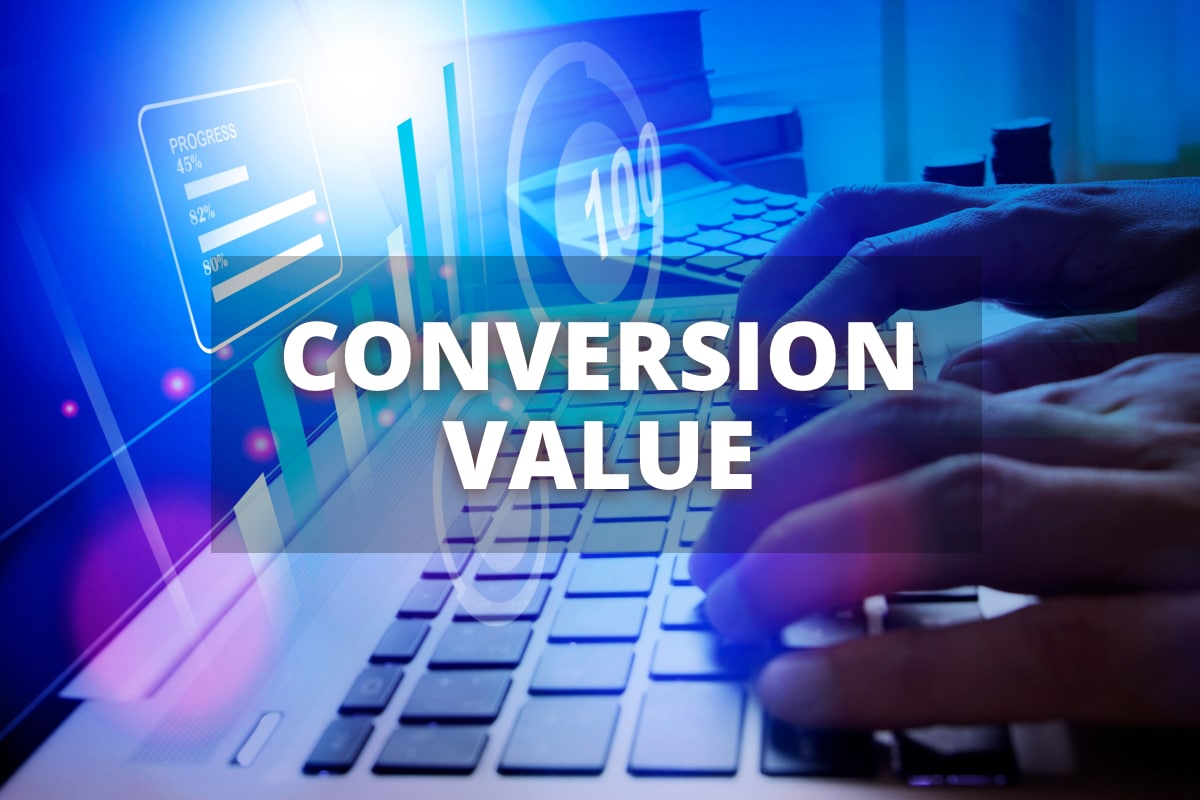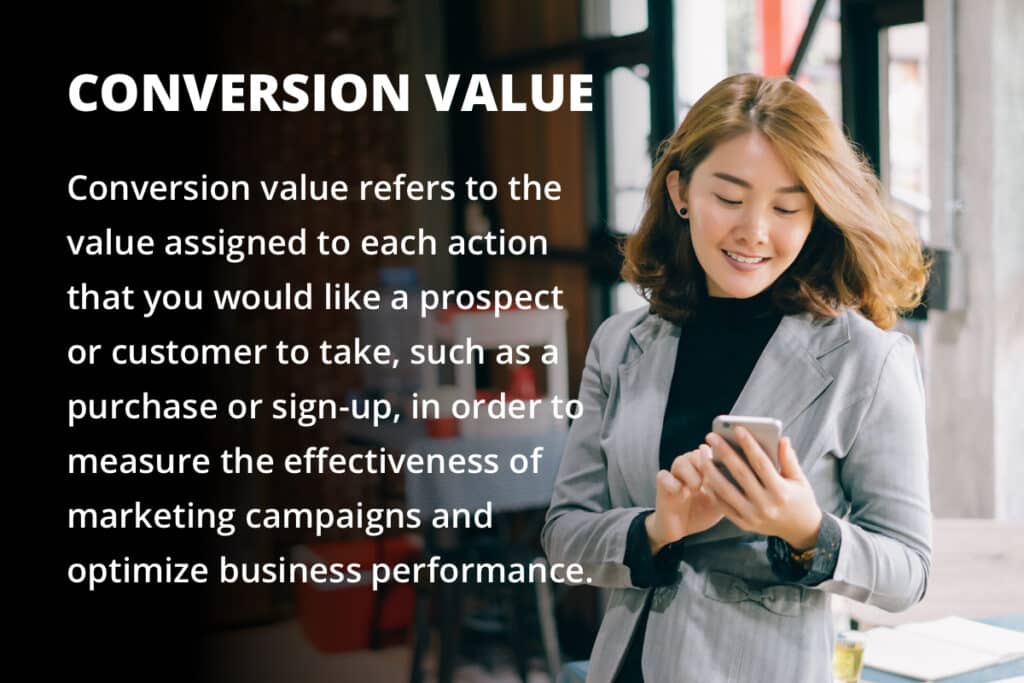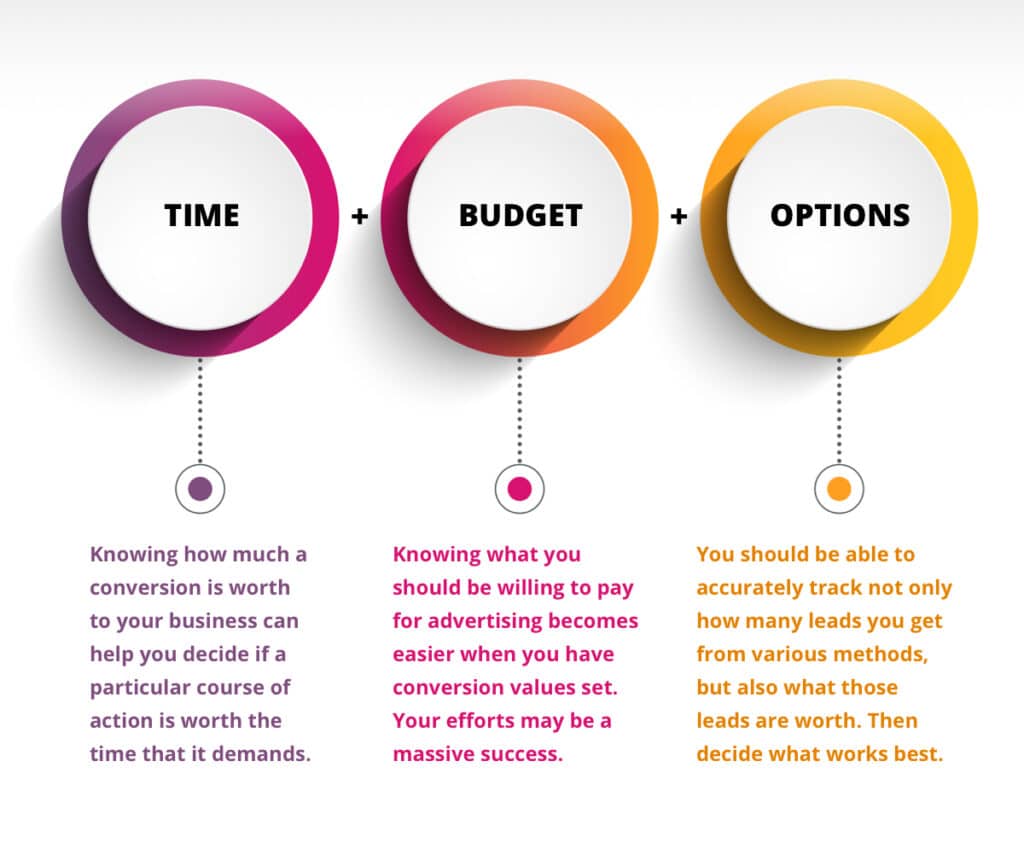
In the world of ecommerce, there are certain metrics that are just accepted as standard. One of those, conversion value, helps business owners to understand clearly how much each conversion is worth to their bottom line. That information can go a long way toward helping those owners, and their employees, make sound decisions that are based on solid financial data.
Outside of the ecommerce realm, however, things look a little different. Sure, “traditional” businesses have plenty of their own metrics that they choose to track, but conversion value doesn’t tend to be among them. This article is going to present an argument in favor of non-ecommerce businesses using conversion value as a worthwhile metric to track, and we’ll also offer some advice on how to make that happen.
What is Conversion Value?

As the name would suggest, conversion value aims to track how much each conversion is worth to you in your business. By a conversion, we mean any action that you would like a customer or prospective customer to take. There are virtually endless types of conversions that you can set for your business, including getting someone to fill out a form, have a discussion with a member of your sales team, try a demo of your product, attend a webinar, sign-up for your newsletter, etc. There is no one-size-fits-all template for what types of conversions you should track – that’s something that needs to be determined on a case-by-case basis for each business (and it can change over time).
Once you know what conversions you are tracking, you can then take the important step of assigning a value to each of those conversions. This value is simply a dollar amount that you have decided each conversion is worth. We’ll talk more later about how to go about this (and why it can be tricky), but for now, it’s the concept that is important – assigning conversion values is a step worth taking because it can inform sound future decisions.
While conversion value is standard practice in the ecommerce world, that’s not really the case elsewhere in business. The only conversions in a traditional business that tend to be given a value are sales. When someone makes a purchase, that’s the ultimate type of conversion, and it is easy to assign it a value because there is a dollar amount tied to the sale. Only seeing sales conversions as having value, however, is missing the bigger picture and will leave you without valuable data that you could use to improve your business.
Why Conversion Values Are Important
We mentioned briefly above that conversion values can help you make good decisions, and we’d like to expand on that notion in the points below. If you are needing a bit more convincing that conversion values are worth your time and effort, the list below should give you that last little nudge –

- Justifying the time spent. Time is money, of course, so knowing how much a conversion is worth to your business can help you decide if a particular course of action is worth the time that it demands. An example will make this concept clearer. Imagine that you have a member of your sales team making cold calls to drum up leads. For each day’s worth of calls, that salesperson is able to book two new meetings. Over the course of a five-day workweek, then, there are ten additional meetings added to the sales schedule. Is that good? There is no way to know without assigning some value to those conversions. If each conversion is only worth $10 to your business, it’s almost certainly not worth continuing this strategy. That would be just $100 of value out of an entire week of making calls. However, if the conversions are worth $100 each, and you get $1,000 of value, the math might look more acceptable.
- Deciding what to spend. Along the same lines, knowing what you should be willing to pay for advertising becomes easier when you have conversion values set. If you run ads that ask potential leads to call for more information, you can attach a value to each call and compare that to how much those ads cost you in the first place. An ad campaign that costs $500 to run and brings in 100 calls that you value at $10 each would be a massive success.
- Comparing your options. Often, the challenge for marketers isn’t finding promotional channels to use, but rather it’s deciding which of the many channels available is most profitable. Again, this is where conversion value tracking pays off in a big way. You’ll be able to accurately track not only how many leads you get from various methods, but also what those leads are worth. With the data clearly laid out in front of you, choosing where to spend your time and money will be easy.
It’s hard to run a business without the right data. If you add conversion values to the list of other data points that you track and use, you’ll have a more complete picture of how your business is operating and what changes you should make.
Identifying Your Various Conversions
So, assuming you are now motivated to assign values to your conversions, we need to know what those conversions look like in the real world. We’d never be able to list all of the possibilities for what you might think of as a conversion, but here are some common options –
- Join an email list. Even if you aren’t an ecommerce company, you likely have an online presence – and collecting email addresses from people who may be interested in your products or services is an important practice. So, you can consider an email signup to be a conversion, and you can seek to attach a value to that action. Once you have that email signup, you have permission to send that person marketing messages directly, which gives you a great chance to turn them into a customer.
- Going through a product demo. This is perhaps as close as a lead can be to making a purchase without actually making the purchase. If you have the type of product that can be demonstrated, typically this is in the B2B space, having a potential customer ask for a demonstration is a huge opportunity to close a sale. It’s likely that this type of conversion will have a relatively high value compared to others because it is so far down the funnel.
- Asking for a quote. When someone reaches out for a quote on your products or services, they are at least interested enough to take time out of their day to take this step. Also, giving them a quote provides you with an opportunity to demonstrate the quality of your customer service and to open up the lines of communication for further conversations.
- Calling for information. Along the same lines as asking for a quote, you might log a conversion when someone calls you to get some questions answered about what you sell. This call could be in response to an ad they saw, or it might be a word-of-mouth referral.
An Inexact Science

One thing you need to know right off the bat about conversion values is that assigning a dollar value to each conversion is always going to involve some guesswork. That doesn’t mean you just pick a number out of thin air and go with it, but you also shouldn’t expect scientific accuracy. Using data that you already have available, you can make some educated guesses to give your various conversions the most accurate valuation possible.
Let’s walk through the basics of how you calculate conversion value. It will become obvious why there is always going to be some wiggle room in the numbers. Imagine that the conversion value you are trying to calculate is for quotes that are requested. Each time a quote is requested, your team sends out that quote and it is recorded for follow-up later. To determine how much each quote request is worth, you’ll need to know what percentage of those quotes turn into purchases, as well as how much those purchases are worth on average.
So, if you send out 20 quotes in a month, and two of them wind up in deals, you will have converted 10% of the quotes into sales. Next, you can use your average purchase size to figure out how much value to give those converted quotes. Let’s say the average sale in your business is $1,000, just for simplicity. The conversion value of someone asking for a quote would then be assigned at $100, because only 1-in-10 are going to wind up converting and spending $1,000.
This is a pretty clean example, but the real world isn’t so kind. You’ll certainly have complicating factors like wide spreads in purchase sizes that make averages somewhat irrelevant. Therefore, you might work on segmenting your math to determine the value of different types of quote requests, such as those for basic projects and those for bigger jobs. As you get more into segmenting, you could figure out where your most valuable leads come from, and treat those differently than
the rest.
Tips to Keep in Mind
Before we wrap up this introduction to the power of conversion values, we’d like to leave you with a couple of final tips –
Return to this topic regularly. Don’t make the mistake of assuming that the conversion values you calculate today are going to remain relevant long into the future. They should be accurate enough to use for a while, but you’re going to want to regularly come back to this topic to update your data and make sure the underlying assumptions you are using remain valid. Even relatively small changes can lead to different conclusions, so stay on top of this moving forward once you get started.
Use technology to your advantage. You don’t have to be an ecommerce company to lean on technology to help you capture some of this information. Use whatever digital tools are relevant to your kinds of leads to automate data collection and produce accurate conversion values with minimal manual work required. You might be surprised to find how well this task can be automated with a little bit of upfront effort applied.
If you own or operate a non-ecommerce business, it’s worth your time to at least consider tracking conversion value as part of your data-gathering process. Knowing your conversion value can make some of the hardest decisions you need to make in your business a little easier, and you can make them with more confidence. Thank you for taking the time to visit and good luck with all of your endeavors!
Most Popular Articles

Seeing Favicons in Your Google Search Results? Here’s Why…
Have you noticed anything different in your Google Search results lately? Google added tiny favicon icons to its organic search results in January. It was…

Business Growth and Digital Marketing News & Tips 11-17-24
Are you encouraging and rewarding innovation? Lee Cockerell is the former Executive Vice President of Operations at Walt Disney World. A lover of traditional red…

Business Growth and Digital Marketing News & Tips 11-27-24
A culture of gratitude "Feeling gratitude and not expressing it is like wrapping a present and not giving it." – William Arthur Ward Beyond being…








